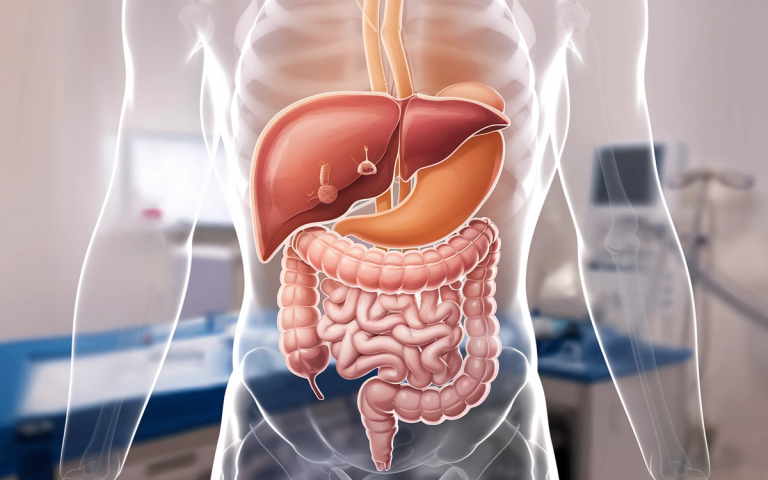Testing for digestive issues: Is your gut trying to tell you something?
- Date:
- 25/04/2025
- Author:
- Pippa Thackeray

Our energy levels, immunity and brain health can all be affected by the health of the digestive system.
People are quick to overlook reflux, bloating and abdominal pain as minor issues. However, these symptoms may point to more serious conditions, including ulcers, infections, food allergies, and intolerances.
Serious or not, digestive complaints experienced regularly in any capacity can reduce quality of life. Debilitating symptom experiences can present a barrier to feeling in control.
What digestive disorders can look like
Digestive health is an overarching term spanning many factors, including the balance of microbiota that occupy our gut, the integrity of the intestinal wall, as well as the digestive system’s role in protecting us from foreign substances.
The digestive system works together with other body systems, including the liver and the immune system.
Disruption of these body systems leads to uncomfortable digestive symptoms such as bloating, constipation and diarrhoea.
How testing can help

Rapid testing options for digestive issues offer a quick and easy resource as a screening tool.
Our range of testing kits delivers results within minutes and covers many aspects of digestive health, such as polyps, infection, food sensitivity and more.
Your test results can help guide the next steps.
Testing for digestive health: what are the options?
As digestive health is such a broad area, knowing where to start can be unclear and perhaps overwhelming at first, especially if you have no prior medical guidance on your symptoms.
You can test many areas with Rezure test kits, including Helicobacter pylori (H. pylori), gluten intolerance, occult blood, and liver function.
Consider the following when choosing a test kit.
Choosing the right testing option for your symptoms
There are tests that are used to assess specific markers. Detection during testing could be antigens in the blood, substances in the urine or blood in the stool.
Your symptoms may help identify which test is appropriate. Alternatively, you may have already been advised by a medical professional.
What is H. pylori?
The H. pylori strain of bacteria is common, affecting around 50% – 70% of the global population. However, many people harbouring this bacteria are asymptomatic, meaning they have no symptoms.
Symptoms may appear because of the development of either gastritis or gastric ulcers.
H. pylori is linked to chronic inflammation, and, in some cases, untreated H. pylori infection can cause stomach cancer.
The following symptoms commonly occur in patients with H. pylori infection who develop stomach ulcers and gastritis:
- Stomach pain after eating
- Nausea
- Loss of appetite
- Early satiety (feeling full quickly after eating)
Other potential symptoms include: Frequent burping, acid reflux and bloating.
How to test for H. pylori
H. pylori rapid tests are designed to analyse stool samples.
The tests use technology to detect H. pylori antigens. A test reading will be available for you after just 10 minutes.
Bowel health
Common symptoms related to polyps, ulcers and cancer of the bowel include:
- Constipation
- Diarrhoea
- Abdominal pain
- Changes in bowel habits
- Blood in the stool
How to test bowel health
Bowel health tests identify faecal occult blood (FOB) in a stool sample, which refers to tiny amounts of blood that cannot be seen without a microscope. It functions as a screening device to detect cancer as well as colonic ulceration and polyps.
Conditions such as colitis, diverticulitis, IBD and fissures may also cause Faecal Occult Blood.
Food intolerances, allergies and coeliac disease

Food reactions can trigger various digestive symptoms, which vary in intensity from mild to severe.
A process of differentiation between a food allergy, intolerance or coeliac disease can be initiated with the appropriate testing.
What is a food allergy?
Allergies often present as a more severe form of reaction.
Skin eruptions can appear like hives and itching, digestive issues like nausea, vomiting, and diarrhoea, and issues of the respiratory tract, like wheezing and difficulty breathing. Symptoms this severe may require urgent medical attention.
How to test for a food allergy
Many allergies are detected through IgE testing. In cases of food allergy where elevated levels of Immunoglobulin E (IgE) are present further testing or treatment will be required to determine the specific food allergen.
What defines food intolerance?
Food intolerances differ from food allergies because they do not involve the immune system. The symptoms associated are related mainly to the digestive system, such as abdominal pain, diarrhoea and bloating.
Food intolerance is unlikely to lead to the potentially life-threatening reactions that food allergies produce.
Gluten and immune responses
Gluten ingestion in a person with gluten intolerance or coeliac disease may cause symptoms.
What is coeliac disease?
Gluten is a protein found in wheat, barley and rye. These foods trigger an autoimmune response in people with coeliac disease.
- Abdominal bloating or discomfort
- Chronic diarrhoea
- Irregular or infrequent bowel movements
- Flatulence
- Loose, pale, oily or foul-smelling stools
- Nausea and vomiting
Coeliac disease can also cause anaemia and fatigue due to a poorly functioning digestive system and poor uptake of nutrients. A person with coeliac disease can reduce their symptoms when their condition is managed correctly.
What defines gluten intolerance?
Non-coeliac gluten sensitivity (NCGS) is another term for gluten intolerance. This means, as the name may suggest, that the person affected does not have coeliac disease but experiences uncomfortable digestive symptoms associated with consuming gluten.
How to test for gluten intolerance or coeliac disease
Through a small blood sample, the test checks for IgA and IgG antibodies specific to deamidated gliadin peptides (DGP). Results can be interpreted after 10 minutes.
This test detects an immune response to gluten. However, NCGS remains a diagnosis of exclusion and can’t be confirmed by this test alone.
Liver function and gut health: what is the connection?

The gut and the liver communicate with each other. Their individual processes are closely linked. For example, poor liver function can disrupt the gut microbiome.
Conversely, these gut microbes are known to alter bile acids that return to the liver, whereby the production of bile acids can be affected.
What is liver disease?
The liver and gut maintain a close relationship which leads to digestive symptoms appearing as liver disease manifestations, and vice versa.
Liver disease as a term describes conditions such as liver failure, cirrhosis and hepatitis, which are commonly associated with impaired nutrient absorption, anaemia and altered gut function.
Signs and symptoms of liver disease may include:
- Persistent low energy
- Bloating
- Early satiety (feeling full quickly after eating)
- Changes in bowel habits
- Itchy or yellowing skin
- Pain or swelling in your legs or abdomen
- Unexplained weight loss
How to test liver health
While not directly used to form a diagnosis, bilirubin and urobilinogen are the markers commonly tested to assess liver health.
Both bilirubin and urobilinogen can be tested with a liver health home test kit.
Who should test for liver health?
Regular testing is recommended to determine liver function status and support whole-body health and well-being.
Testing is of high priority in those with diabetes, on long-term medication or those who consume large amounts of alcohol.
Understanding your digestive health is an important step in feeling your best.
Whether you’re experiencing discomfort or just want peace of mind, at-home tests offer a simple, accessible way to check for common issues like infections, intolerances, or liver function.
These tools help you take control, guiding you toward the right next step, whether that’s a lifestyle change or speaking with a healthcare professional.
Your digestive health is central to your overall wellbeing, and knowledge is a powerful place to start.


